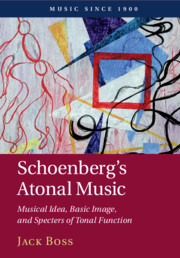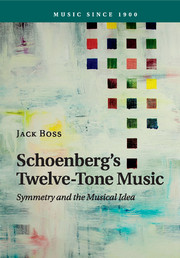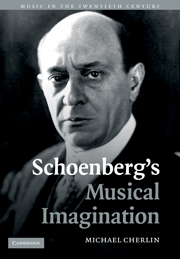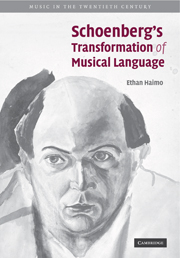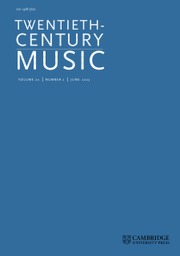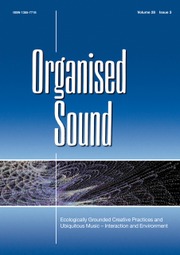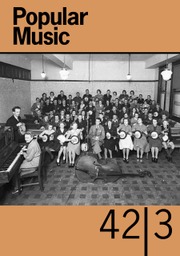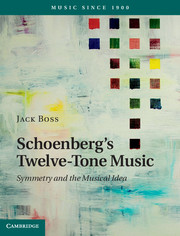Schoenberg's Atonal Music
Musical Idea, Basic Image, and Specters of Tonal Function
$46.99 ( ) USD
Part of Music since 1900
- Author: Jack Boss, University of Oregon
- Date Published: June 2019
- availability: This ISBN is for an eBook version which is distributed on our behalf by a third party.
- format: Adobe eBook Reader
- isbn: 9781108321525
Find out more about Cambridge eBooks
$
46.99 USD
( )
Adobe eBook Reader
Other available formats:
Hardback, Paperback
Looking for an examination copy?
If you are interested in the title for your course we can consider offering an examination copy. To register your interest please contact [email protected] providing details of the course you are teaching.
-
Award-winning author Jack Boss returns with the 'prequel' to Schoenberg's Twelve-Tone Music (Cambridge, 2014) demonstrating that the term 'atonal' is meaningful in describing Schoenberg's music from 1908 to 1921. This book shows how Schoenberg's atonal music can be understood in terms of successions of pitch and rhythmic motives and pitch-class sets that flesh out the large frameworks of 'musical idea' and 'basic image'. It also explains how tonality, after losing its structural role in Schoenberg's music after 1908, begins to re-appear not long after as an occasional expressive device. Like its predecessor, Schoenberg's Atonal Music contains close readings of representative works, including the Op. 11 and Op. 19 Piano Pieces, the Op. 15 George-Lieder, the monodrama Erwartung, and Pierrot lunaire. These analyses are illustrated by richly detailed musical examples, revealing the underlying logic of some of Schoenberg's most difficult pieces of music.
Read more- Analyses several pieces to indicate exactly how the details of an atonal piece relate to its central idea or image
- Uses Schenkerian analysis to demonstrate significant differences between tonal and atonal music
- Shows the expressive role that tonality played in Schoenberg's atonal music after it was banished as a structural device
- Includes numerous musical examples and illustrations to support both the author's analyses and the reader's own interpretations
Reviews & endorsements
‘Schoenberg's Atonal Music offers a study of the endlessly fascinating and enigmatic music Schoenberg wrote from around 1908 to roughly 1920. Jack Boss is a complete master of the music and the surrounding literature; he has an appropriate and effective analytical methodology, and he offers a synoptic understanding of these challenging musical works that greatly enriches our understanding of them. This book is an important prequel to Schoenberg's Twelve-Tone Music (Cambridge, 2014), which deservedly received the Wallace Berry award from the Society for Music Theory.' Joseph Straus, City University of New York
See more reviews‘With this provocative re-interpretation of six of Schoenberg's middle-period works, Jack Boss turns time-honored conceptions of tonality versus atonality and ‘amotivicism' on their heads. Through his vividly argued analyses grounded in motivic/set-class relations, the ‘conflict-elaboration-resolution model' of the ‘musical idea', and the use of ‘expressive' tonality, Schoenberg's Three Piano Pieces, Op. 11, reveal a novel structural identity, cohering in a unified cycle. Erwartung, previously understood as the quintessence of amotivicism, finds logic in the development of a ‘basic image', two leitmotifs representing the Lover's body and the Woman's sense of loss. With further analyses based on the concepts of ‘musical idea', ‘basic image', and ‘spectres of tonality', Boss thus propounds a fascinating revisionist history – a consistent and steady development to and from atonality, setting the stage for Schoenberg's future twelve-tone works.' Severine Neff, Eugene Falk Distinguished Professor of Music, Emeritus, University of North Carolina, Chapel Hill
'Jack Boss’ book, Schoenberg’s Atonal Music, presents a unified, integrated, and consistent picture of the composer’s middle period compositional processes and works in contrast to the dichotomies of tonal versus atonal, atonal versus serial, and intuitive verses rational composer found in much Schoenberg scholarship. Boss creates an analytical model that links Schoenberg’s tonal, atonal, and serial compositions, demonstrates the processes found in his tonal works continue albeit transformed by new structural resources in the atonal works, and demonstrates the organicism and applicability of pitch-class set analysis as a consequence of Schoenberg’s method of working with and transforming small intervallic patterns.' Ciro Scotto, Ohio University
Customer reviews
Not yet reviewed
Be the first to review
Review was not posted due to profanity
×Product details
- Date Published: June 2019
- format: Adobe eBook Reader
- isbn: 9781108321525
- contains: 132 music examples
- availability: This ISBN is for an eBook version which is distributed on our behalf by a third party.
Table of Contents
1. Tonal oder Atonal? The complicated, contradictory nature of Schoenberg's middle-period music (Op. 11, No. 1)
2. Piano pieces Op. 11, Nos. 2 and 3: The latter movements of a remarkably progressive cycle
3. Das Buch der hängenden Gärten, Op. 15, Nos. 7 and 11: basic images in two of the earliest atonal pieces
4. Erwartung, Op. 17: A Leitmotivic Opera and a 'cumulative setting', atomized
5. Six little piano pieces, Op. 19 (Nos. 2, 3, and 6): musical idea and basic image in miniature
6. Pierrot lunaire, Op. 21, Nos. 1, 14 and 21: basic image at the apex of its development
7. Summary, and the way forward to twelve-tone music.
Sorry, this resource is locked
Please register or sign in to request access. If you are having problems accessing these resources please email [email protected]
Register Sign in» Proceed
You are now leaving the Cambridge University Press website. Your eBook purchase and download will be completed by our partner www.ebooks.com. Please see the permission section of the www.ebooks.com catalogue page for details of the print & copy limits on our eBooks.
Continue ×Are you sure you want to delete your account?
This cannot be undone.
Thank you for your feedback which will help us improve our service.
If you requested a response, we will make sure to get back to you shortly.
×
